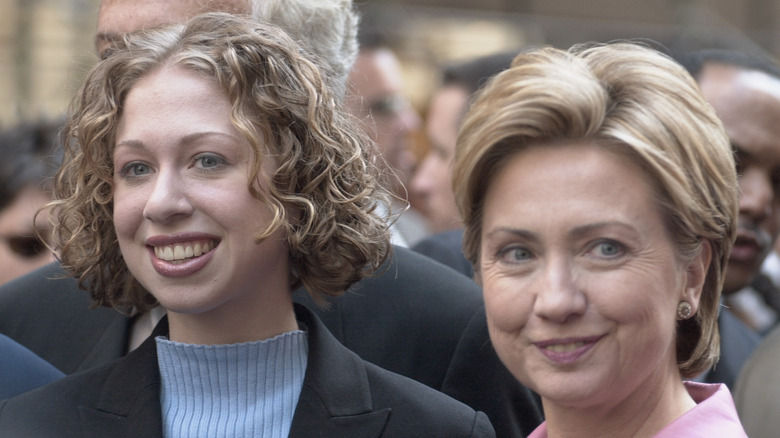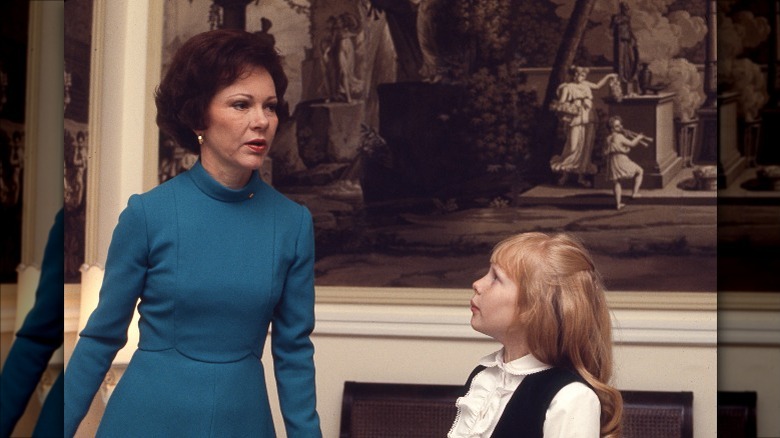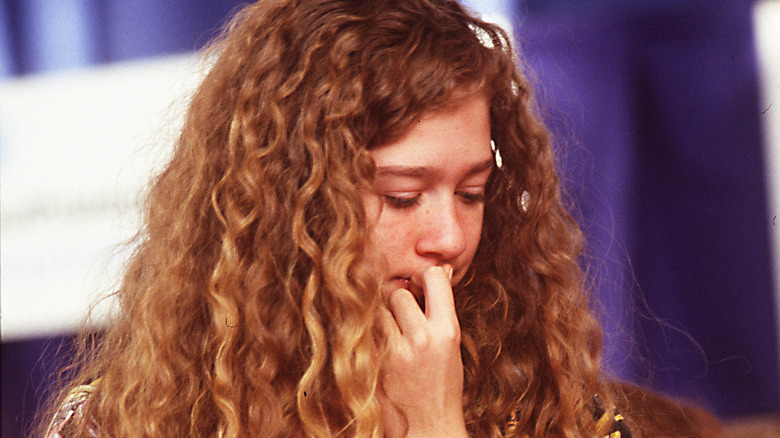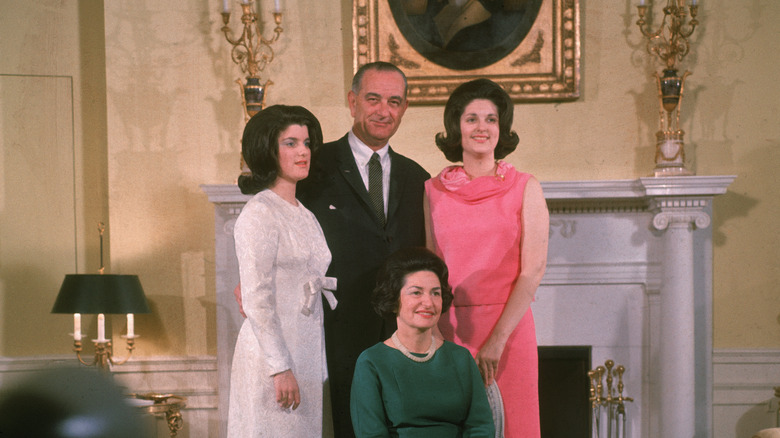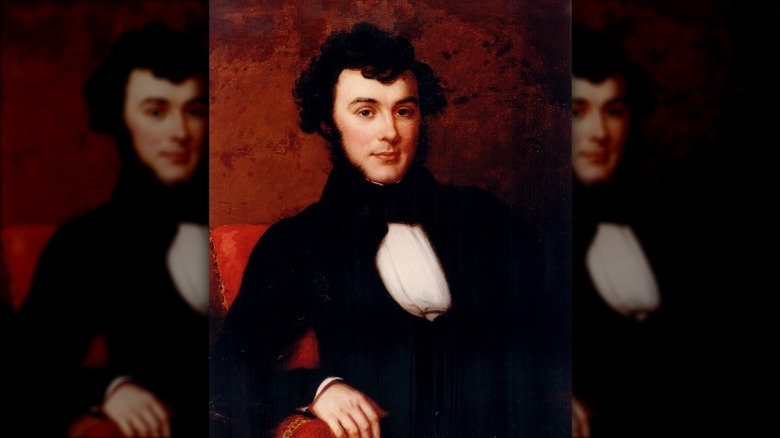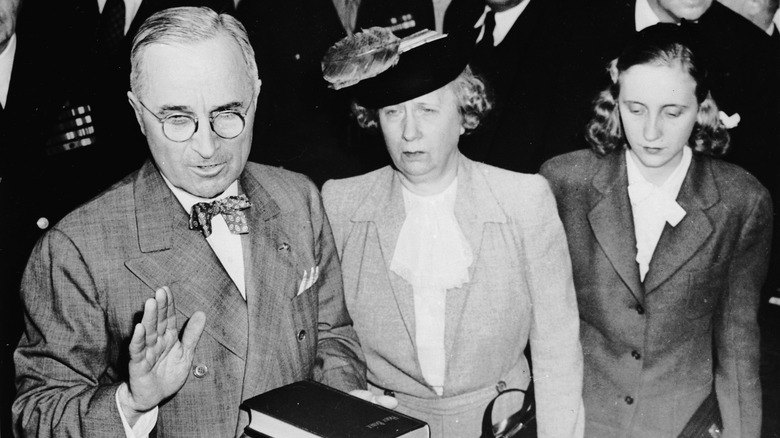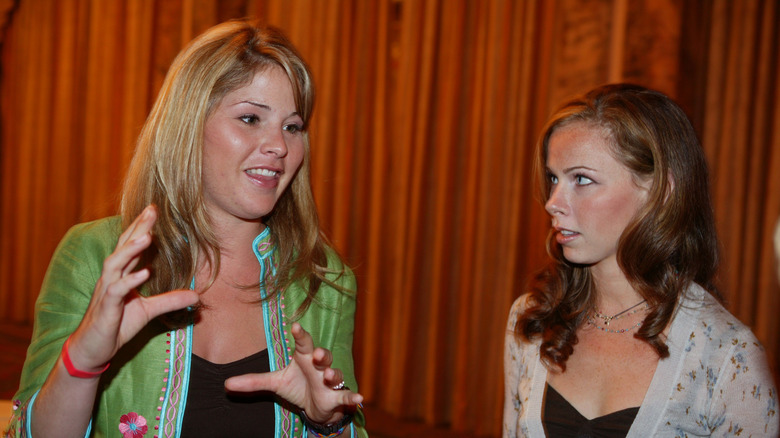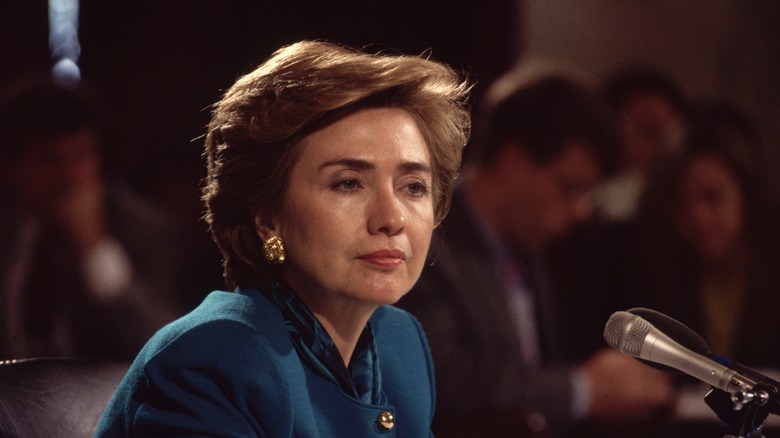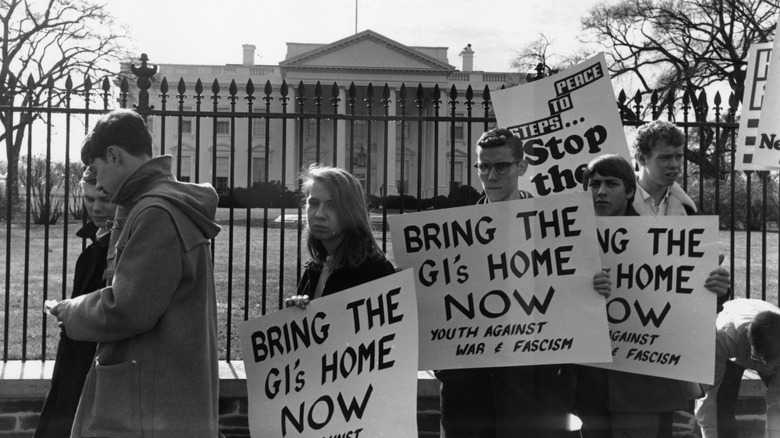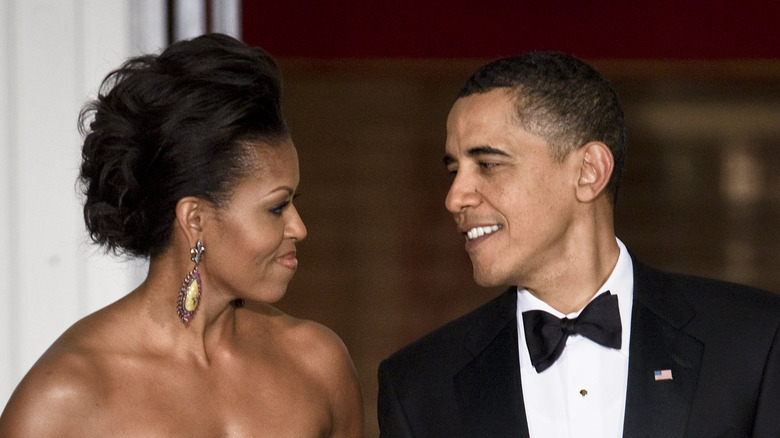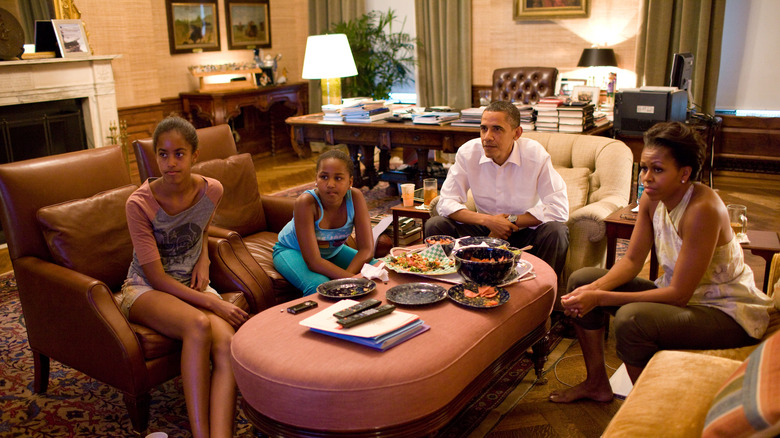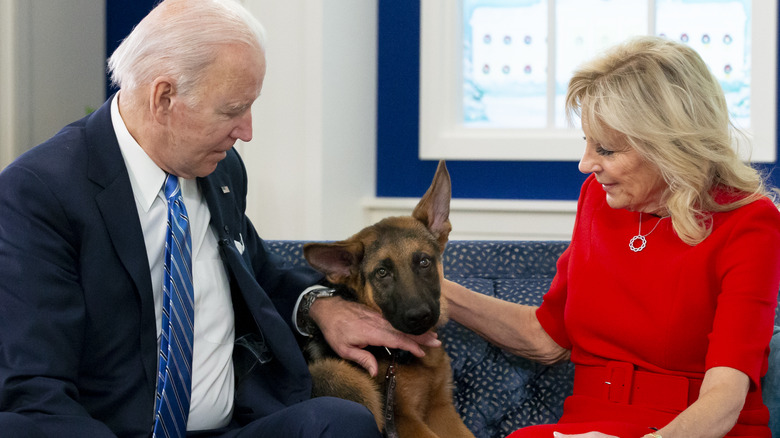The Worst Things About Being A Member Of The First Family
As of 2022, only 45 people (all men) in history could say they were president of the United States. It's one of the hardest and unlikeliest achievements even for people who work their whole lives to get there.
While you can see why someone who is passionate about government, deeply patriotic, and pathologically ambitious would want to be president of the U.S., the loved ones they bring along for the ride might not be so thrilled about it. "One of the worst things in the world is being the child of a President," Franklin Roosevelt once said (via Time). "It's a terrible life they lead." He would know, considering he put his six children through the experience for a dozen years. And plenty of first ladies discovered that getting the role just because they were married to a guy wasn't their dream situation either. That's not even getting into what the poor presidential pets go through.
While there are obvious perks to living in the White House, not having to worry about paying rent or cooking your own meals or even cleaning your room, it seems plenty of presidential relations would have given it up in a heartbeat just to live a normal life again. It turns out that even things that might appear to be positive at first glance can be major buzzkills. And people who have experienced it aren't afraid to share their thoughts. These are the worst things about being a member of the First Family.
First Kids have to leave everything they know
If you had to pick up and move during your childhood, you know how difficult and even traumatic it can be for a kid to have to start over. Now imagine you're not just the new kid, but the First Kid.
Susan Ford, daughter of Gerald Ford, was luckier than most, since her father had been a part of the government in D.C. for so long that it was just her normal life already. Plus, she was almost an adult when Richard Nixon resigned and her father became president. Susan told People, "I was a senior in high school, and the lucky thing is we lived in Washington, so I didn't have to change schools like other president's children."
Not everyone had it so good. Susan's father was defeated in 1976 by Jimmy Carter, who had his own young daughter. Rather than feeling any bitterness towards the child of the man who kicked her dad out of the White House, Susan just felt terrible for her: "My heart broke for Amy Carter, who had to move to Washington and make new friends and go to a new school. It's hard on those kids." In fact, the whole world saw how seemingly unhappy the 9-year-old Amy was, since the media was there to capture photos of her new life in America's capital. First Lady Rosalynn Carter, quoted in "The Residence: Inside the Private World of the White House" (via Erenow) recalled, "When she went to school the first day in Washington everybody was so distressed because Amy looked so lonely. That was just her normal life."
The media tears them apart – even the kids
There's a tacit agreement that while a president and even, to a lesser extent, the first lady are legitimate targets of critique, jokes, and insults, their children are supposed to be off-limits, at least when those children are minors. However, that doesn't mean no one ever goes after First Kids, even young ones, in some truly cruel ways.
Susan Ford, daughter of Gerald Ford, had "devastating" stories printed about her, including that the only reason she didn't fail out of school was because of who her father was. "I felt very besieged by the press," she said (via The Baltimore Sun). "They knew where I was all the time. They talked to my friends, people who weren't even my friends. They wrote about romances I wasn't having." "Saturday Night Live" made fun of both Amy Carter and Chelsea Clinton when they were children. The 21st century didn't see much improvement. In a Facebook post (via Erenow), Republican House staffer Elizabeth Lauten attacked the underage Obama girls for their outfits at a Thanksgiving turkey pardoning event, writing, "Dress like you deserve respect, not a spot at a bar."
In the Truman family, it wasn't daughter Margaret who had the biggest problem with the intrusiveness of the press, but her mother, First Lady Bess Truman. "She felt she was entitled to her privacy. I tried to tell her that she wasn't, but it made no impression," Margaret told The Washington Post.
It's hard to trust anyone's motivations
Most famous people would probably agree that once you become well-known, you have to second guess the motivations of almost everyone around you. Do they actually care about you, or do they want money or a favor or even just to be close to a celebrity? That level of paranoia, while warranted, must do terrible things to your psyche. And the relatives of presidents didn't make a career choice knowing they might end up becoming world-famous.
Susan Ford Bales, daughter of Gerald Ford, said (via The Baltimore Sun) that the stories that appeared about her affected her deeply, and that the experience "makes you not very trusting of anybody except your family." Margaret Truman told The Washington Post that she was lucky her mother "taught me to be careful. I made some friends here in New York who certainly didn't want anything. You can usually tell fairly soon."
In "The Residence: Inside the Private World of the White House" (via Erenow), Lynda Bird Johnson Robb, daughter of Lyndon Johnson, said that outside of her family, there were some people who she trusted, and luckily they were very close to home during her father's time in the White House: "The people who worked there, they were just wonderful. I'm sure everybody who's lived there has appreciated them and thought how lucky we are to be surrounded by people who want to help us and who are not trying to get anything from us. They were not going to go sell us out."
First Kids can have a hard time later in life
It's not just modern First Kids who find being the child of a president difficult. In the 19th century, there was a pattern of serious difficulties for presidential offspring, often lasting long after their fathers left the White House.
Advisor to the first President Bush, Doug Wead even wrote a detailed report for grownup presidential son George W. Bush on what some historical First Kids had faced in life, assumedly to warn him away from following the same path. Time covered the gist of the report, which recounted how many First Kids died young, often from accidents, substance abuse, or illness. They also had trouble finishing school or holding down jobs. At least one, John Quincy Adams' son George Washington Adams (pictured), probably died by suicide. "The common pathology [among presidents' kids] is that they have a difficult time establishing their own separate identity from the president," Wead explained.
The issues didn't stop with the turn of the 20th century, though. Author Mark Rozell, an expert on the media coverage during the Carter administration, told The Baltimore Sun, "A lot of people look back and wonder if all the attention paid to Amy Carter wasn't overdone, if she didn't suffer personal problems as a result of the intense scrutiny."
Secret Service protection is really annoying
Perhaps no other change to their lives affects First Families as much as the sudden addition of Secret Service agents to everything they do. And those who were teens or young adults when their fathers became president don't mince words about how much these brave, burly bodyguards totally cramped their style. As Gerald Ford's daughter Susan succinctly put it to People, "A teenager's worst nightmare is having the Secret Service."
Even Ronald Reagan's son Michael, who was in his mid-30s when his father was elected, told the same outlet that he too found the change difficult: "All of the sudden the Secret Service comes into your life and is with you 24 hours a day. They were very nice, but you feel almost like an outsider in your own house. Your life changes. You lose all of your privacy. It's basically gone. You have to sit there and swallow it and say 'Okay, this is what it is' and bear with it."
But perhaps no one has expressed the stark reality of life under constant surveillance as pitifully as Margaret Truman, quoted in "The Residence: Inside the Private World of the White House" (via Erenow): "I ask you to consider the effect of saying good night to a boy at the door of the White House in a blaze of floodlights with a Secret Service man in attendance. There is not much you can do except shake hands, and that's no way to get engaged."
They get in trouble if they want time to themselves
According to "The Residence: Inside the Private World of the White House" (via Erenow,) Margaret Truman called the White House "the great white jail." And like prisoners in actual jail, sometimes First Kids might want to try to escape. But if they do manage to get some time by themselves, a few precious minutes not under the watchful eye of the Secret Service, they can find themselves in big trouble.
One of the Bush twins was apparently notorious for her getaway attempts. "Jenna would purposely try to lose her protection by going through red lights or by jumping in her car without telling agents where she was going," Ronald Kessler writes in "In the President's Secret Service: Behind the Scenes With Agents in the Line of Fire and the Presidents They Protect" (via Page Six). Susan Ford also once "made a run for her car" (per Erenow) and drank beer with a friend in a supermarket parking lot before returning to the White House to face her father.
At the other end of the spectrum was good girl Chelsea Clinton, who confessed to People, "I once ... went through a light and, like, the Secret Service got caught behind the other light and [I] pulled over immediately of course, and waited for them. But I was like, 'Oh my God, like, I'm outside of their immediate line of sight for, like, two minutes.' And I think I apologized for two weeks. I felt so horrible."
They have to figure out what being a First Lady even means
Being first lady is possibly one of the most complicated jobs in the world, starting with the fact that it isn't technically a job. As Marie Wilson, founder of the White House project, explained in The Washington Post, the role of the first lady is stuck in the past, an unpaid position that just assumes every woman will be willing to drop her life and career to follow her husband to the White House and support him while he leads the Free World. But over 230 years after George Washington took office, that's not how marriages work anymore.
But woe to the first lady who sees herself as an equal partner rather than just window dressing and a good hostess. Historian Christopher Andersen explained to The Guardian, "Hillary Clinton wasn't interested in baking cookies, she really wanted to be a co-president. This got her in trouble so she had to step down a bit."
Barack Obama wrote in his memoir (via The Washington Post) that Michelle also had difficulty accepting the outdated terms of being first lady: "Look beautiful. Care for your family. Be gracious. Support your man. For most of American history, the First Lady's job had been defined by these tenets, and Michelle was hitting all the marks. What she hid from the outside world, though, was the way her new role initially chafed, how fraught with uncertainty it felt."
They see how much people dislike their loved ones
It's normal to get angry or annoyed at your father or husband, but that doesn't mean you want everyone else to tell you how much your loved one sucks. And while politicians know what they are getting into and have built up thick skins, for their families, the negative press and opinions of strangers can be devastating.
This is especially true for those close to presidents who were in charge during unpopular wars. Jenna Bush Hager, daughter of President George W. Bush, knows this all too well. As a young adult when her father was getting America involved in the war in Afghanistan and Iraq, it would have been impossible to ignore the anger and accusations up to and including her father being labeled a war criminal. (Not to mention his disastrous handling of Hurricane Katrina, leading to Kanye West's infamous televised comment that "George Bush doesn't care about Black people.") Jenna told People, "It's hard to disassociate who you see as a person, as your father, who you adore, and then to have the world see him a different way."
President Lyndon Johnson's daughters were a similar age when Americans were turning against the Vietnam War. According to WAMU, lying in bed in the White House, they could hear protestors outside chanting, "Hey, hey, LBJ! / How many kids did you kill today?" Historian Joshua Kendall says, "It's tough for a man in his 50s [to hear that song], but for girls 18 years old, that's pretty intense to hear."
It can badly affect their marriage
No matter how happy their marriage might have been before, the strain of moving into the White House tests every First Couple. All of a sudden, a president has a million demands on his time, ones that the people doing the demanding probably consider a lot more important than just spending time with his wife.
In a biography of her mother Bess, Margaret Truman wrote (via The Washington Post) that her mother experienced extreme anger and frustration as it became clear she was no longer her husband's equal and partner, but a "spectator" looking at his presidency from the outside. "She felt more and more superfluous. This feeling combined with her original opposition to Harry Truman becoming president to build a smoldering anger that was tantamount to an emotional separation," Margaret revealed.
The Obamas might have always seemed like #couplegoals, but Barack wrote candidly about how badly becoming president affected even their deep connection. In his memoir (via The Washington Post) he wrote about Michelle's anger with the situation: "It was as if, confined as we were within the walls of the White House, all of her previous sources of frustration became more concentrated, more vivid, whether it was my round-the-clock absorption with work, or the way politics exposed our family to constant scrutiny and attacks, or the tendency of even friends and family members to treat her role as secondary in importance." He wrote he'd lie awake worried that their marriage would never recover.
It's not a normal homelife
While the pressures of living in the White House might be hardest on the marriage of a president and the first lady, the overall family dynamic changes as well. And for presidential children used to a relatively normal life, there are many changes to hanging out with their parents that come as a shock.
Steve Ford had just started college when his father Gerald Ford became president after Richard Nixon resigned. But he would still come home from school to see his family, although since "home" was now the White House, things had drastically changed. "It was truly like living in a museum," he said in "The Residence: Inside the Private World of the White House" (via Erenow). "Everything dates back to Lincoln or Jefferson. I can remember moving in there—at home usually I put my feet up on the table where we lived in Alexandria, but Mom goes, 'Don't put your feet up there! That's Jefferson's table.'"
And as cool as living surrounded by so much history and being part of history yourself might seem, First Kids say it's really not. Margaret Truman admitted to The Washington Post, "I wouldn't call it fun. The only thing I ever missed about the White House was having a car and driver." And when the Obamas left the White House, George W. Bush's daughters sent Sasha and Malia a meaningful letter. "You won't have the weight of the world on your young shoulders anymore," the Bush twins wrote (via WAMU).
First Pets can have a hard time adjusting to the White House
If it's hard enough for human relatives to adjust to the life changes brought on by moving to the White House, imagine how hard it is for a different species, one that has no clue what is happening. As dog trainer Leigh Dempsey told The Washington Post in 2021, shortly after Joe Biden became president and moved into the White House with his two German Shepherds, "Everybody knew at some point that Major and Champ were going to the White House. The only two that didn't know were Major and Champ."
This explained why the younger dog, Major, was having some problems adjusting to his new life, which resulted in some highly publicized biting and nipping incidents. "He's probably not being handled by the people that he knows and trusts the most, which were the president and first lady," says Dempsey. "All of that can just be very overwhelming and stressful for any dog."
But Major was far from the only White House pet to make the news for misbehaving. Another notable naughty dog was President Theodore Roosevelt's bulldog Pete, who made headlines in 1907 after he attacked a worker at the White House. This was after he had already "chased a South American diplomat up a tree and incidentally chewed two or three policemen who went to the aid of the distinguished foreigner." As his list of victims grew, Pete finally had to be "banished" from the White House.
